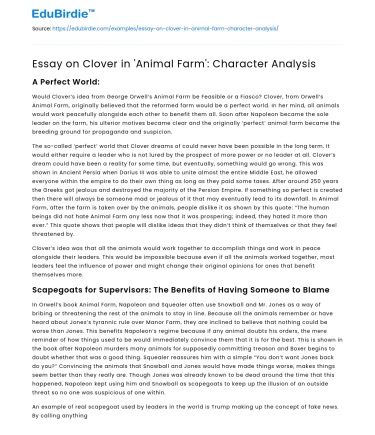Introduction
George Orwell's "Animal Farm" is a nuanced allegory that delves into the complexities of power, control, and social dynamics. Within this microcosm of society, Clover, a diligent and motherly cart horse, serves as a crucial character whose development reflects the broader themes of the novel. As a representation of the proletariat, Clover embodies the working class's endurance and vulnerability in the face of manipulation by the ruling class. Her character is instrumental in illustrating the gradual erosion of idealism and the rise of totalitarianism. This essay will explore Clover's character, examining her symbolism, the evolution of her role in the narrative, and her interactions with other characters to understand her contribution to the overarching message of Orwell's work. Through an analysis of Clover's actions and thoughts, we gain insight into the consequences of blind loyalty and the importance of critical awareness in maintaining societal integrity.
Clover as a Symbol of the Proletariat
Clover, in "Animal Farm," symbolizes the proletariat, representing the working-class individuals who are often subjected to the whims of those in power. Her character is defined by her unwavering dedication to the farm's collective goals, mirroring the real-life experiences of laborers who are exploited for the benefit of the ruling elite. Orwell crafts Clover as a figure of strength and resilience, her physical prowess and tireless work ethic epitomizing the essential qualities of the working class. However, her naivety and trust in the leadership led by Napoleon, the pig who emerges as the dictator, illuminate the precarious position of laborers in a society where power is concentrated in the hands of the few.
Save your time!
We can take care of your essay
- Proper editing and formatting
- Free revision, title page, and bibliography
- Flexible prices and money-back guarantee
Clover's inability to challenge the pigs' authority, despite her growing suspicions, underscores the theme of manipulation and control. Her loyalty is exploited by the pigs, who manipulate the commandments of Animalism to justify their actions. As noted by literary critic Peter Edgerly, "Clover's trust in authority figures allows the ruling class to perpetuate their dominance without resistance" (Edgerly, 2020). This manipulation is evident when Clover observes the pigs walking on two legs, a blatant violation of Animalism's principles, yet she struggles to reconcile her observations with her ingrained beliefs. Her internal conflict highlights the dangers of unquestioning loyalty and the suppression of dissenting voices.
The Evolution of Clover's Consciousness
Throughout "Animal Farm," Clover's consciousness evolves as she witnesses the gradual betrayal of the revolution's ideals. Initially, she is depicted as a staunch supporter of the rebellion, eager to work towards a utopian society. However, as the narrative unfolds, her growing realization of the pigs' corruption becomes apparent. Her role transitions from a passive participant to a more critical observer, albeit one who remains unable to instigate change. This evolution is significant as it reflects the broader disillusionment experienced by many who lived through oppressive regimes, such as during the Russian Revolution, which Orwell allegorically critiques.
Clover's transformation is poignantly illustrated in her interactions with other animals, particularly Boxer, the other cart horse. While Boxer remains steadfast in his belief that "Napoleon is always right," Clover's doubts begin to surface. This divergence in perspectives between the two horses exemplifies the spectrum of responses within the working class to authoritarian manipulation. Despite her misgivings, Clover's inability to articulate her concerns effectively underscores the limitations imposed by the lack of education and political awareness among the proletariat. As scholar Julie Cross notes, "Clover's journey reflects the struggle for consciousness in a society where truth is obscured by propaganda" (Cross, 2019).
Clover's Interactions and Moral Dilemmas
Clover's interactions with other characters in "Animal Farm" further illuminate her moral dilemmas and the complexities of her position. Her relationship with the other animals is characterized by empathy and compassion, attributes that make her a natural caregiver within the community. However, these qualities also render her vulnerable to exploitation. The pigs, particularly Squealer, exploit Clover's concern for the collective well-being to maintain control over the farm. Squealer's rhetorical manipulation, often invoking Clover's loyalty to the cause, serves to pacify her doubts and reinforce her subservience.
Despite her nurturing nature and growing awareness of the pigs' tyranny, Clover remains conflicted, unable to take decisive action against the injustices she witnesses. This moral paralysis is emblematic of the broader challenges faced by individuals in oppressive systems, where fear and indoctrination stifle resistance. Clover's internal struggle is poignantly captured in her reflections, as she grapples with the disparity between the farm's reality and the ideals of Animalism. Her dilemma is reflective of the real-life struggles faced by individuals in totalitarian regimes, where the cost of dissent is often too high.
Conclusion
In conclusion, Clover's character in "Animal Farm" serves as a powerful representation of the working class, highlighting the complexities and vulnerabilities inherent in their position within a hierarchical society. Through her unwavering dedication and evolving consciousness, Orwell illustrates the dangers of blind loyalty and the insidious nature of authoritarian control. Clover's interactions and moral dilemmas underscore the challenges faced by individuals in oppressive systems, where the pursuit of truth and justice is fraught with obstacles. Her character serves as a poignant reminder of the importance of critical awareness and the need for collective action to safeguard democratic ideals. Ultimately, Clover's journey reflects the broader themes of Orwell's allegory, emphasizing the need for vigilance and resistance in the face of tyranny.






 Stuck on your essay?
Stuck on your essay?

